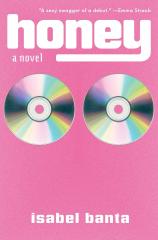Honey
Review
Honey
In HONEY, debut novelist Isabel Banta casts a nostalgic but critical eye on the glossy era of Y2K pop music, when Britney Spears, *NSYNC and Backstreet Boys ruled the Billboard charts and the hearts of teen girls.
Banta follows a singer named Amber Young from her days as a nervous preteen competing on “Star Search” to a chart-topping idol on “TRL.” Amber’s road to stardom begins in suburban New Jersey, where she lives in a dingy apartment with her single, alcoholic mother and older brother. A talent agent catches her performance at a school talent show, and soon after Amber’s resentful mother is shuttling her into Manhattan for a series of disappointing, dispiriting auditions.
"Isabel Banta skillfully interrogates a culture that regularly sexualized young women (and then criticized them for that sexualization) while crafting a compelling portrait of a woman coming into her own."
Amber is a “sponge for failure,” and these early, painful attempts to chase stardom go nowhere. But a few years later, Amber tries again. She’s seeking more than just fame or for someone to recognize her considerable talent as a singer. What she’s after is the same thing many young women are seeking --- someone to see her, give her their approval, and perhaps tell her who she is. She is “desperate for praise” and searching for something that will change her “from a gaseous to a solid thing.”
Amber gets lucky. She joins a girl group called Cloud9, which also includes Gwen Morris, with whom she soon becomes close friends. In Amber’s eyes, Gwen is everything she is not: confident, charismatic and a good dancer. Before long, Gwen ditches Cloud9 for a successful solo career. At first, Amber is devastated, but Gwen’s move inspires her own exit from the group.
Seen from the outside, Amber’s rise to fame appears to be seamless and preordained. In reality, it’s a carefully crafted affair. Barely old enough to vote, she is constantly being watched and evaluated by men, a phalanx of executives and agents who see her as an object to be shaped into a saleable product. Amber, desperate to be wanted and fearful of rejection, goes along with their plans, despite some reservations. During an early meeting with label execs, she’s asked if she’s a virgin. She worries that when she confesses she’s not, it will sink her nascent career. Instead, her sexual experience is seen as an asset. Her label markets her as the edgier, more risqué alternative to her more wholesome rivals, including Gwen.
A split emerges between Amber the star and Amber the person. To the media and her fans, she’s a provocative pop princess. In real life, she’s a young woman trying to navigate her own sexuality, a complicated relationship with a member of the boy band ETA, and her growing desire for autonomy. As Amber’s star rises and she grows older, her effort to reconcile her personal and private selves becomes more urgent and more fraught.
In HONEY, Banta imagines fictionalized versions of stars like Britney and Christina Aguilera and gives readers a peek at their rich inner lives, which are far more complex than they seem from the outside. She offers a pointed critique of how such stars were presented in the media, through eyebrow-raising magazine covers, scandalous videos and faux-concerned questions from journalists. (Amber is repeatedly asked if she feels she’s a good example to girls and young women. “I’m setting the only possible example I can, by being myself,” she replies, somewhat evasively.) Song lyrics, news articles and Q&As from teen magazines help flesh out the story and emphasize the split between Amber as a person and Amber as a cultural product. However, the choice to wrap up the book with Amber’s Wikipedia entry is oddly anti-climactic.
Amber is a sympathetic and relatable narrator, even when she’s gliding along through a world of immense privilege. Though her life is in many ways enviable, she’s trapped in a proverbial gilded cage. Once she becomes famous, she also becomes rootless. We never see her in her own home. Instead, she drifts from hotel room to stage to recording studio. She is wealthy but has no control over her own finances.
“We are like children at their parent’s knees, pulling at fabric, asking for change,” Amber says of herself and her fellow stars after she realizes she has no cash to pay for an abortion. (Amber’s decision to end her pregnancy, along with a hinted-at eating disorder and a predatory manager, all could have been explored in more depth.) Invasive paparazzi capture intimate, embarrassing moments, which are then displayed in every tabloid in the country. It’s both evidence of her moral failure and a reinforcement of her brand. “Being called a slut and a whore won’t impact my career,” she realizes. “Notoriety is preferable to obscurity.”
Smart and entertaining, HONEY is a slick, feminist coming-of-age tale that taps into a well of millennial nostalgia. Isabel Banta skillfully interrogates a culture that regularly sexualized young women (and then criticized them for that sexualization) while crafting a compelling portrait of a woman coming into her own.
Reviewed by Megan Elliott on June 29, 2024
Honey
- Publication Date: July 1, 2025
- Genres: Fiction
- Paperback: 336 pages
- Publisher: Celadon Books
- ISBN-10: 1250333482
- ISBN-13: 9781250333483




